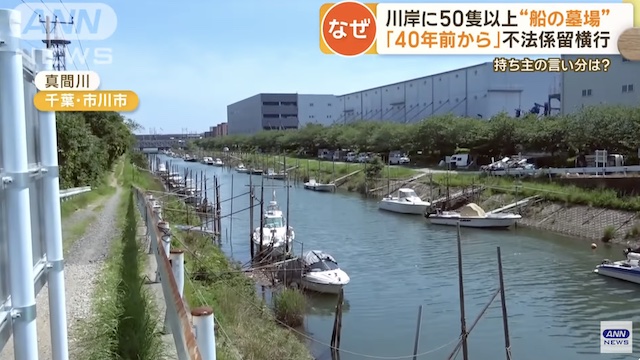CHIBA, Jun 17 (News On Japan) - The Mamagawa River, which flows through Ichikawa City in Chiba Prefecture, is lined with a well-maintained promenade that residents enjoy for their daily walks. However, the downstream area beyond the bridge reveals a starkly different scene.

A car lying on its side with its undercarriage exposed, a hood flipped up, and inexplicably, a tire placed on top of another tire are just some of the sights in this area. Other vehicles have all their windows shattered, missing tires, and their interiors scattered with broken glass. Peering inside reveals even more items, from televisions to mattress-like objects, filling the spaces.
The abandoned cars, many entwined with plants, have evidently been left untouched for quite some time. A nearby worker in his 60s said, "As far as I know, it's been like this for nearly 10 years."
Upon inspection, the program counted 14 vehicles in total, including a truck with 'Roasted Sweet Potatoes' written on it, complete with a menu board and seemingly still in use. Intriguingly, the license plates on this truck did not match, and a gasoline receipt dated April 24th this year was found inside.
Six mini-trucks are parked nearby, some with sweet potatoes left in their beds, suggesting recent use. It appears that a group might be using this area as a makeshift parking lot, which is a violation of river laws whether the vehicles are parked or abandoned.
A local resident in his 40s shared, "My dog injured its paw during a walk, so we avoid this path now. It feels unsafe."
Another resident in their 20s commented, "I think removing these vehicles is necessary for safety and public order."
The Chiba Prefecture Civil Engineering Office has been issuing warnings through signs and posters, urging the vehicle owners to clear the area.
Illegal Mooring Persists for Decades
The issues along Mamagawa River extend beyond abandoned cars. Over 50 boats, all illegally moored, line a 500-meter stretch of the river. These boats, moored to unauthorized piers, also violate river laws.
During the investigation, the team encountered a returning boat owner who admitted, "I built the pier myself and have been mooring here for about 10 years. I moved here after the Great East Japan Earthquake because my pier in Urayasu was destroyed."
The owner claimed he chose this spot because other boats were already there, and he did not realize it was illegal. He acknowledged the recent signage prohibiting mooring and stated, "If directly told to leave, I would comply as I’m over 70."
Another boat owner explained, "Boats have been moored here for about 40 years. There’s no other place to dock, so we've continued using this spot."
The location's convenience for accessing Tokyo Bay makes it ideal for fishing boats, contributing to its popularity. However, many boats abandoned in the river pose a threat during floods, potentially damaging the riverbanks.
A local resident remarked, "I thought these boats were legally moored and fees were being paid. Isn't that the case?"
The Civil Engineering Office has pledged to identify boat owners and enforce the removal or relocation of these vessels.
Source: ANN














